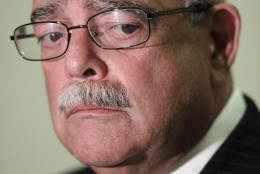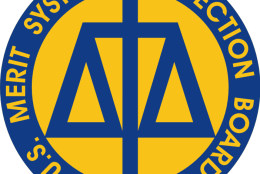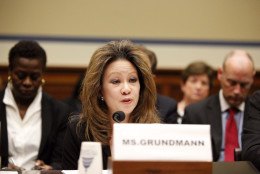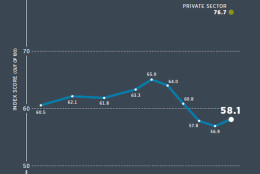Federal Employee Viewpoint Survey
-
Acting Director of the Office of Personnel Management Beth Cobert is encouraging feds to fill out the Federal Employee Viewpoint Survey before it closes in June, listing changes at OPM as proof that agencies pay attention to and act on the results.
June 01, 2016 -
Members of the House Oversight and Government Reform Subcommittee on Government Operations took the Homeland Security Department to task for six straight years of declining employee engagement scores on the Federal Employee Viewpoint Survey. DHS is ranked as the worst agency to work for in government.
April 27, 2016 -
Russ Deyo, DHS’ undersecretary for management, is holding each of the department’s components accountable for specific plans, milestones and approaches that focus on root causes of employee dissatisfaction.
April 08, 2016 -
If we start with these seven basics, we could have the potential to design a more accountable civil service that is free of political influence.
April 07, 2016 -
Federal employee engagement has been studied extensively through the Office of Personnel Management's annual viewpoint study. Julie Osowski, senior research psychologist at Merit Systems Protection Board, tells Federal Drive with Tom Temin about MSPB's effort to look beyond the external factors that affect employee engagement.
March 28, 2016 -
Too many federal workers do not feel safe speaking honestly with their supervisors and agency leaders.
March 15, 2016 -
The Merit Systems Protection Board processed nearly 30,000 cases in fiscal 2015, a 63 percent increase over 2014, according to an annual report.
March 03, 2016 -
The Office of Personnel Management will clarify and create new tools to help agency leaders better understand the authorities they already have to recruit and retain new employees and boost engagement in their workplaces, says Mark Reinhold, OPM's associate director for employee services and chief human capital officer.
February 19, 2016 -
The Office of Personnel Management's tools and pilot programs to improve federal hiring and workforce engagement have improved in some areas but stalled in others.
January 11, 2016 -
Across the federal government, there's quite a bit of agency-by-agency variation in the number of workers who choose to participate in the Federal Employee Viewpoint Survey. But some agencies are finding that they can boost their response rates pretty significantly by offering incentives to complete the survey. Do those incentives unfairly bias the results? Jeff Neal says there's no evidence for that, and agencies should want to see the highest response rates they can get on the survey. Neal is a former chief human capital officer at the Department of Homeland Security. He wrote a column on the subject. He talked with Jared Serbu on Federal Drive with Tom Temin about the types of incentives agencies can and can't offer.
December 21, 2015 -
Federal employees are a bit happier with their jobs than a year ago. A bit. The latest Federal Employee Viewpoint Survey shows a 1 percent increase. Tim McManus is vice president for education and outreach at the Partnership for Public Service, which compiled the numbers. He told Federal Drive with Tom Temin not to discount that importance of 1 percent, even if there's still a long way to go.
December 14, 2015 -
For the first time in four years, federal employee satisfaction and commitment improved among the workforce, according to the Partnership for Public Service's 2015 Best Places to Work in the Federal Government.
December 08, 2015 -
Real leadership development takes an agency that is willing to make the investment of time and money needed to build strong supervisors, says Jeff Neal, senior vice president of ICF International.
November 05, 2015 -
The Office of Personnel Management has rolled out "frameworks" for more consistent leadership training across the government. The guidance suggests timelines for teaching both substance and soft skills to managers.
October 15, 2015 Federal employees overall are more optimistic about their jobs, coworkers, leaders and compensation than they were in 2014. But a closer look at the data reveals troubling signs.
October 08, 2015












